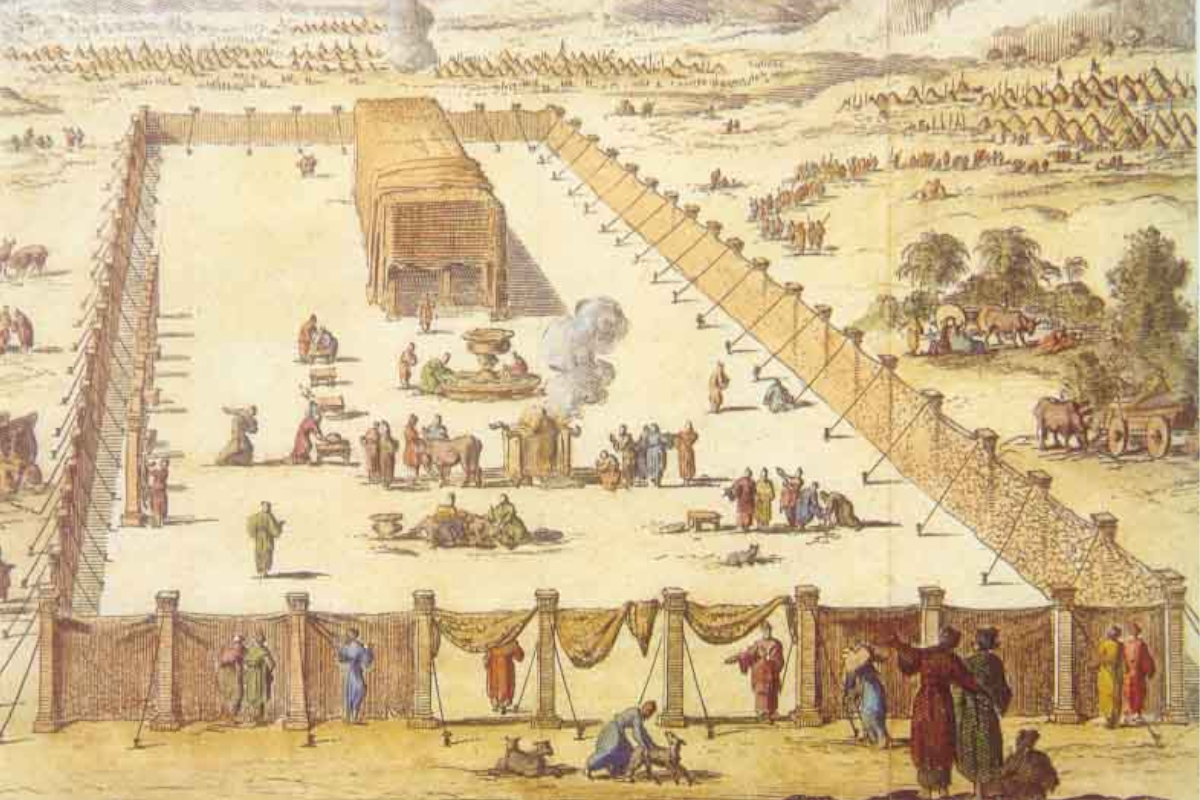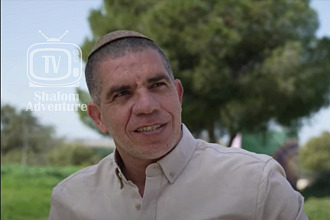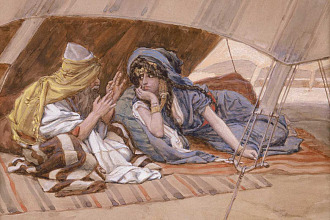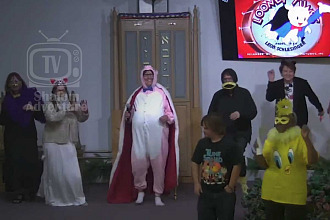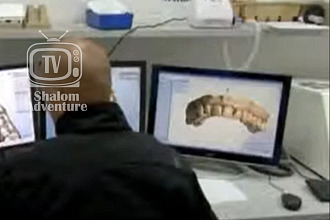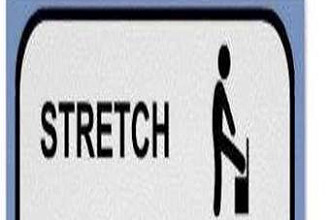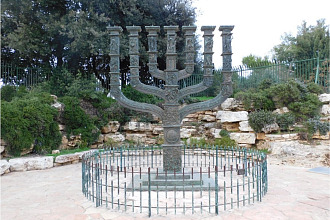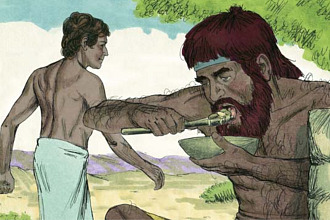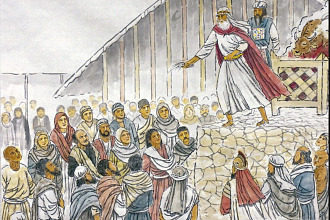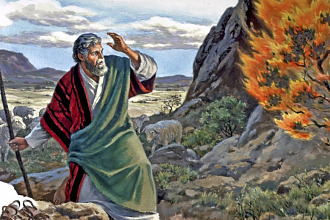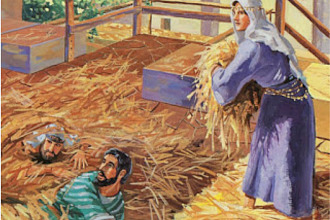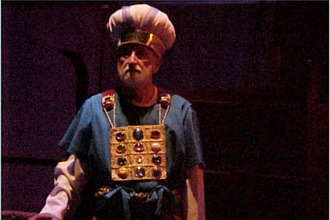Parasha for the Week: Vayakhel: Exodus 35:1 - 38:20.
Aftarah for the Week: 1 Kings 7:13 – 51.
Besorat Yeshua: Mark 15:42 - 16:6.
Overview
Moshe Rabbeinu exhorts Israel to keep Shabbat, and requests donations of materials for making the Mishkan. He collects gold, silver, precious stones, skins and yarn, as well as incense and olive oil for the menorah and for anointing.
A princes of each tribe brought precious stones for the Kohen Gadol's breastplate and ephod. G-d appoints Betzalel and Oholiav as the master craftsmen.
Bnei Yisrael contribute so much that Moshe begins to refuse donations. Special curtains with two different covers were designed for the Mishkan's roof and door. Gold-covered boards in silver bases were connected, forming the Mishkan's walls. Betzalel made the Holy Ark (which contained the Tablets) from wood covered with gold.
On the Ark's cover were two figures facing each other. The menorah and the table with the showbreads were also of gold. Two altars were made: a small incense altar of wood overlaid with gold, and a larger altar for sacrifices made of wood covered with copper.
Having a Willing Heart
Moses commanded the Jewish people regarding the materials for the Tabernacle: “Whoever is of a willing heart, let him bring an offering of the Almighty” (Exodus 35:5). What lesson do we learn from the command being directed to those who have a “willing heart”?
Rabbi Simcha Zissel of Kelm explains that those who brought the offerings for the Tabernacle should bring their hearts with their offering. It is not sufficient just to give a monetary donation. The Almighty wants our hearts, that is our thoughts and our emotions.
The Third Temple
A heathen once asked the Talmudic sage Rabbi Eliezer this question: After having two Temples destroyed, why are you still waiting for the Third Temple. Why do you think that the Third Temple will be different? Rabbi Eliezer answered: Contrary to the first two Temples, the third one will not be built by man but by G-d. Thus, the Third Beth Hamikdash will last forever.
Called by name
The Torah states: “the LORD has called by name Betzalel son of Uri son of Hur, of the tribe of Judah; he has filled him with divine spirit, with skill, intelligence, and knowledge in every kind of craft, to devise artistic designs, to work in gold, silver, and bronze” (Exodus 35:30-3). What does it mean that God called him by name? God knows each of us personally, by name. He knows everything about us and He loves us. He has given each of us abilities and talents to use in His service. And He calls each of us to use those talents for His honor and glory.
“God desires that His workers in every line shall look to Him as the Giver of all they possess. All right inventions and improvements have their source in Him who is wonderful in counsel and excellent in working. The skillful touch of the physician's hand, his power over nerve and muscle, his knowledge of the delicate organism of the body, is the wisdom of divine power, to be used in behalf of the suffering. The skill with which the carpenter uses the hammer, the strength with which the musician makes the instrument ring, comes from God. He has entrusted men with talents, and He expects them to look to Him for counsel. Whatever we do, in whatever department of the work we are placed, He desires to control our minds that we may do perfect work” (Christ’s Object Lessons, p. 349).
Stop Giving
The offerings came in so plentifully that Moses had to command the Jewish people to stop bringing materials for the Sanctuary: “And Moses gave commandment, and they caused it to be proclaimed throughout the camp, saying, Let neither man nor woman make any more work for the offering of the sanctuary. So the people were restrained from bringing. For the stuff they had was sufficient for all the work to make it, and too much” (Exodus 36:6,7). The people had given so willingly and generously that more than enough material was made for the building of the sanctuary. Of course this did not mean they were to stop giving their tithes and offerings for the work of the Levitical ministers or the upkeep of the sanctuary; only that they had enough for the building project. This is a wonderful testimony of God's grace upon people's hearts. There is no record of anyone lacking anything because of their generosity. On the contrary the Biblical text records that all the time in the wilderness they had no lack and that their shoes did not wear out. “I have led you forty years in the wilderness: your clothes are not become old, and your shoe is not become old upon your foot” (Deut. 29:5).
While the building of the sanctuary was in progress, the people, old and young-- men, women, and children-- continued to bring their offerings, until those in charge of the work found that they had enough, and even more than could be used. And Moses caused to be proclaimed throughout the camp, “Let neither man nor woman make any more work for the offering of the sanctuary. So the people were restrained from bringing.” The murmurings of the Israelites and the visitations of God's judgments because of their sins are recorded as a warning for future generations. And their devotion, their zeal and liberality, are an example worthy of imitation. All who love the worship of God and prize the blessing of His sacred presence will manifest the same spirit of sacrifice in preparing a house where He may meet with them. They will desire to bring to the Lord an offering of the very best that they possess. A house built for God should not be left in debt, for He is thereby dishonored. An amount sufficient to accomplish the work should be freely given, that the workmen may be able to say, as did the builders of the tabernacle, “Bring no more offerings” (Patriarchs and Prophets, p. 344).
Haftara: 1 Kings 7:13 - 51
Parasha: God asks Israel to continue to build the sanctuary, Moses choose Betzalel for all artistic work because he was skilled. “Then Moses said to the Israelites: See, the LORD has called by name Betzalel son of Uri son of Hur, of the tribe of Judah; he has filled him with divine spirit, with skill, intelligence, and knowledge in every kind of craft, to devise artistic designs, to work in gold, silver, and bronze” (Exodus 35:30-3).
Haftara: About four hundred year later Solomon choose Hiram from Tyre for artistic work because he was a skilled man: “King Solomon sent for Hiram and brought him down from Tyre. He was the son of a widow of the tribe of Naphtali, and his father had been a Tyrian, a coppersmith. He was endowed with skill, ability, and talent for executing all work in bronze. He came to King Solomon and executed all his work” (1Kings 7:13-14).
The great lesson of this haftara is that when we want to do or to build something for the Lord we have to do our best, to select the best material for the Lord.
Before dying, David gave to Solomon all instruction about the temple and commanded his son to build the House of the Lord. He prepared everything and gave a lot of treasure for that house. Solomon followed the instruction given by David and when everything was finished he put all the treasure David gave him in the temple. “When all the work that King Solomon had done in the House of the LORD was completed, Solomon brought in the sacred donations of his father David -- the silver, the gold, and the vessels -- and deposited them in the treasury of the House of the LORD” (1Kings 7:51). Doing this donation, David followed the command of Moses who said to Israel to make donation for the sanctuary. What a great lesson for each one of us. It is unfortunately when the Lord ask us for an offering and donations for his work, and we keep the best part for ourselves and give only what is left over to the Lord.
Besorat Yeshua: Mark 15:42 - 6:6
In this reading the Mashiach has been rejected, given to the Roman solders to make an example of Him. It was almost Passover, the time of the sacrifice of the Passover lamb, The Messiah who is our Passover lamb died for our sins so the angel of death would pass over us.
Because this special day was the day of the preparation for the Shabbat, Yeshua's body was taken down. “When evening had come, and since it was the day of Preparation, that is, the day before the Sabbath” (Mark 15:42).
A Jewish man, a member of the Sanhedrin, who believed that Yeshua was the Mashiach, wanted to give to Yeshua a decent buriel. “Joseph of Arimathea, a respected member of the council, who was also himself waiting expectantly for the kingdom of God, went boldly to Pilate and asked for the body of Y'shua” (Mark 15:43). Only Pilate can give this permission. Pilate knew that some believers could invent stories about the Nazarene, so he wanted to be sure that Yeshua died before delivering his body for the burial: Then Pilate wondered if he were already dead; and summoning the centurion, he asked him whether he had been dead for some time. When he learned from the centurion that he was dead, he granted the body to Joseph” (Mark 15:44-45).
All the preparation for his burial was done, he was buried in the tomb. However the great miracle of the resurrection occurred. “Very early on the first day of the week, when the sun had risen, they went to the tomb. An angel appeared to them and affirmed: ‘Do not be alarmed; you are looking for Y'shua of Nazareth, who was crucified. He has been raised; he is not here. Look, there is the place they laid him’” (Mark 16:2,6).

